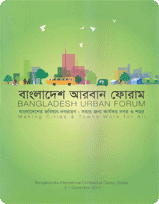
1st Conference of BUF
- Background
- Context
- Themes of the 1st Session of BUF
- Venue
- Messages
- Programme Details (5-7 December, 2011): At a Glance
- Inaugural Session
- Urban Exhibition
- Programme Sessions - Day 1
- Programme Sessions - Day 2
- Programme Sessions - Day 3
- Declaration
- Closing Session
- Feedback of the Participants
- Participation in the First Sessions of the BUF
- Organizers and Partners
- Organizing Committee
- Sub-committee(s)
- Read news of BUF in National Dailies
- Photo Gallery
Inaugural Session
The three-day conference, "Bangladesh's Urban Future: Making Cities and Towns Work for All", was organised to facilitate sharing of experience and knowledge among the stakeholders to contribute to the formulation and implementation of policies and improving practices in the urban sector management, primarily aiming to reduce urban poverty.
The Honourable President inaugurated the three day long (5-7 December, 2011) event for the first Session of the newly formed Bangladesh Urban Forum at Bangabandhu International Conference Centre in the city.
Spekaing as the Chief Guest Zillur Rahman said that as the country's resources are limited but population is vast, all villages should be developed in order to prevent the flow of people towards towns and cities.
“Not only towns, all areas of the country will have to be brought under the balanced development to build the 'Sonar Bangla' as dreamt by the Father of the Nation Bangabandhu Sheikh Mujibur Rahman”.
He urged the urban planners and others concerned to ensure all sorts of civic amenities while planning for urbanisation. “I deem that urbanisation will be environment friendly, healthy, safe, and balanced”, he said.
Zillur Rahman said it is true urbanisation that could play a strong role in accelerating economic growth, but rapid urbanisation creates social and economic discrimination. “Slums are created here (in the capital) alongside the high-rises, though it is not expected”.
LGRD and Cooperatives Minister Syed Ashraful Islam, State Minister for Housing and Public Works advocate Abdul Mannan Khan, and UN resident coordinator and UNDP resident representative Neal Walker also spoke at the function as special guests. State Minister for LGRD and Cooperatives Jahangir Kabir Nanak presided over the inaugural session.
Describing urbanisation as ongoing process, Syed Ashraf said population in urban areas has annually been increasing at a rate of 3.5 percent, which is 2.5 times higher than the overall population growth in the country.
The LGRD minister said the government is working to formulate an appropriate urbanisation policy, strengthen the local government institutions, and ensure civic rights for all.
Two important milestones have been reached this year in the process of urbanization. Firstly, for the first time in history, more people in the world now live in cities and towns than in rural areas. Secondly, in Bangladesh, stakeholders will soon hold the country’s first Bangladesh Urban Forum.
It is true that Bangladesh has some distance to go before urbanites outnumber their rural counterparts. Presently the ratio is about 1 to 2. But this is changing fast. The urban population is six times larger now than it was at Independence while the rural population has grown by only 70 percent.
It is understood that Bangladesh will continue to experience rapid urbanization into the future and, therefore, it has to be managed intelligently. This understanding has encouraged shifts in important policy documents, such as the 2009 MDGs Progress Report, which notes the importance of pro-poor urban policies to ensure poverty reduction; the draft National Urban Sector Policy outlines a vision of an equitable, efficient and sustainable urban future; and the Sixth Five-Year-Plan lays out a detailed strategy to manage the urban transition in the short-term. The United Nations Development Assistance Framework for 2012-2016 includes pro-poor urban development as one of the key focuses alongside other more recognized development priorities such as tackling climate change and poverty. Other bi- and multilateral development partners are also designing development projects aimed at ensuring sustainable and equitable urban development.
This First Session of the BUF heralds the process that will continue with programs and events held throughout 2012 and beyond, leading to subsequent BUF national events.
BUF Organizers






